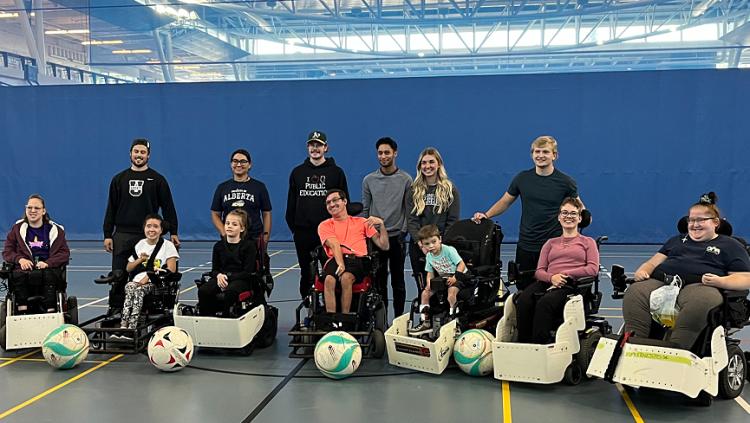One of the best things about attending the University of Lethbridge for Chase Petruska was the ability to pursue research he was keenly interested in. He found that freedom in Dr. Gerlinde Metz's lab at the Canadian Centre for Behavioural Neuroscience and his research led to the establishment of a powerchair soccer program for those with physical disabilities.

Chase Petruska, second row right, established the Lethbridge Powersoccer Program as a way to help relieve stress for individuals with physical disabilities.
"My brother has cerebral palsy, so I've always been interested in individuals with physical disabilities," says Petruska, who's now a master's student in Metz's lab. "We are really close and he's pretty much my motivation for everything."
Petruska coaches his brother's team in the Calgary Power Hockey League (CPHL) and seeing the players laughing, smiling and having a great time spurred his interest in doing research to find more ways to help people like his brother and ensure the needed support and care is in place. The COVID-19 pandemic and its restrictions were difficult for everyone, but it led to even more social isolation for people with physical disabilities.
"The pandemic made everyone a bit more on edge and was stressful for us all," says Metz. "But the physically disabled community is particularly vulnerable, and was affected more than the average person in the population because they lack mobility to go out."
Petruska wanted to investigate mental health and stress in people with physical disabilities, but he could find very few previous studies that looked at the relationship between these factors.
"When I came to Lethbridge and saw there was no specific activity for individuals in powerchairs to do, I thought it would be a good idea to look at this powerchair soccer intervention and then we could also measure the impact it made on their resilience and mental health," he says.
Along with establishing the Lethbridge Powersoccer Program, he recruited participants for his research study where they responded to a questionnaire about their mental health and provided saliva and urine samples. The results became part of Petruska's honours thesis.
"We found that individuals with physical disabilities were more susceptible to stressful situations like COVID and social isolation," he says. "We also found that individuals who had non-family caretakers reported more depressive and anxiety symptoms, as well as a decrease in physical activity."
Given those findings, Petruska suspects other factors may be involved, such as the type of caregiving situation, and he's continuing his research as part of his master's program.
When it began in the fall of 2021, the powersoccer program operated out of a community gym up until Christmas time. The new year found them without a place to play until the University stepped up with both gym time and storage space.
"We are very grateful the University makes research possible and, at the same time, enables this program for community members who are in dire need of an intervention and social support," Petruska says.
The league currently has five players, with five more who are interested when the league starts back up this month. The league has received funding through the Alberta Cerebral Palsy Sports Association to cover the cost of gym rental and bumpers for the powerchairs. In addition, Petruska's family and Dr. Jamshid Faraji, senior research associate in Metz's lab, have pitched in to help with collecting samples and questionnaires.
Metz sees much potential in this type of research for people with physical disabilities, especially those who've experienced a sudden loss of mobility. Getting used to using a wheelchair comes with both physical and mental challenges and more research could help find ways to mitigate the stress that goes along with those challenges.
"Because our lifestyles are very complex and everyone experiences different levels of stress, we don't really know how stress and mental health affect our physical health," says Metz. "Therefore, we decided to also investigate biological signatures of stress, such as metabolic changes."
The results may also point to new interventions aimed at reducing stress, such as weightlifting or even virtual reality.











